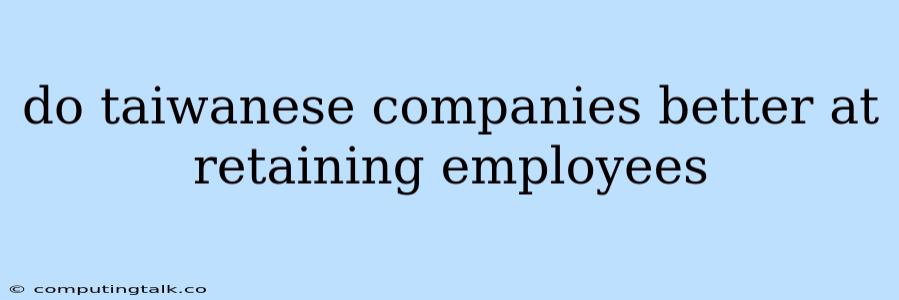Taiwanese companies have a reputation for being successful in retaining employees, but is this truly the case? It's a complex question with no easy answers, as the landscape of employee retention is shaped by various factors. This article delves into the factors influencing employee retention at Taiwanese companies, exploring the common practices that contribute to their success.
What Makes Taiwanese Companies Successful in Retaining Employees?
Several factors contribute to the high employee retention rates in Taiwanese companies. Here are some of the most notable:
- Strong Company Culture: Many Taiwanese companies foster a strong sense of community and shared purpose. This "family" atmosphere, where employees feel valued and respected, can significantly contribute to their loyalty and willingness to stay.
- Long-Term Employment: The concept of long-term employment is deeply ingrained in Taiwanese culture. Companies often invest in their employees' growth and development, promoting a sense of stability and commitment.
- Emphasis on Training and Development: Many Taiwanese companies prioritize ongoing training and development programs for their employees. This investment not only improves skills but also demonstrates a commitment to employee growth, encouraging long-term commitment.
- Competitive Compensation and Benefits: Taiwanese companies typically offer competitive salaries and benefits, including healthcare, retirement plans, and generous bonuses. This helps attract and retain talent.
- Strong Work Ethic: Taiwanese employees are known for their strong work ethic and commitment to their companies. This dedication plays a vital role in fostering a loyal and dedicated workforce.
Are There Challenges to Employee Retention in Taiwan?
While Taiwanese companies generally have good employee retention rates, there are challenges they face:
- Work-Life Balance: The traditional work culture in Taiwan can be demanding, and employees sometimes struggle to achieve a healthy work-life balance. This can lead to burnout and turnover, especially among younger generations who prioritize flexibility and personal time.
- Aging Workforce: Taiwan's aging workforce presents challenges in attracting and retaining younger talent. Companies need to adapt their strategies to appeal to younger generations, emphasizing flexibility, work-life balance, and opportunities for professional development.
- Competition from Global Companies: Taiwanese companies face increasing competition from multinational companies that often offer higher salaries and more opportunities for global mobility.
How Can Taiwanese Companies Continue to Thrive in Employee Retention?
To maintain their edge in employee retention, Taiwanese companies need to adapt to the changing needs of the workforce:
- Embrace Flexibility and Work-Life Balance: Companies should explore flexible work arrangements, including remote work options and flexible hours, to attract and retain talent who value work-life balance.
- Invest in Technology: Adopting new technologies can streamline operations and improve employee efficiency, freeing up time for personal life and reducing stress.
- Cultivate Inclusive Workplace Cultures: Creating inclusive workplace cultures where all employees feel valued and respected is crucial for retaining diverse talent.
Conclusion
Taiwanese companies have a strong track record of retaining employees, but they must continue to adapt to the changing needs of the workforce to maintain their competitive edge. By fostering a positive and supportive work environment, investing in employee development, and embracing flexibility, Taiwanese companies can continue to attract and retain top talent in the years to come.
